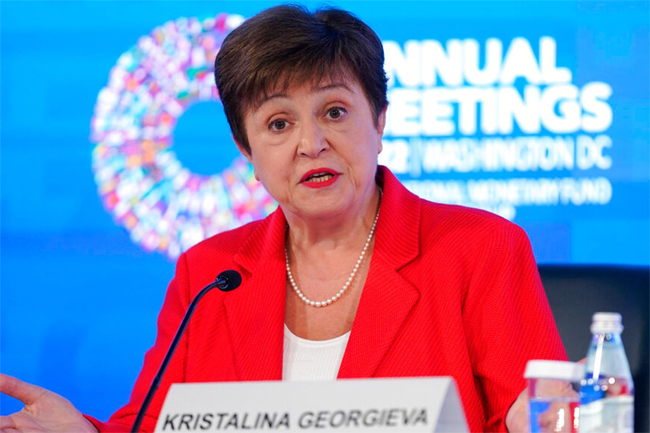IMF to expand donor coordination to countries like Sri Lanka
October 14, 2022 11:48 am
The Managing Director of the International Monetary Fund (IMF) says the global financial agency is pressing for a more debt resolution mechanism.
Delivering the opening remarks at the press conference for the 2022 Annual Meetings of the IMF and the World Bank Group (WBG), Kristalina Georgieva said, “We want the G20 Common Framework to become more predictable, with clear guidelines and equality of treatment for all creditors, public and private.”
She also stated that the IMF is also looking for ways to expand that kind of donor coordination to middle-income countries, such as Sri Lanka.
“There is a lot to do this week. We must act urgently, and act together to make a difference in the lives of hundreds of millions of people,” Georgieva said further.
Speaking further, Georgieva stated that the world economy has been hit hard by the outbreak of Covid-19, Russia’s invasion of Ukraine and climate disasters, which resulted in a cost-of-living crisis.
Stating that the IMF on Tuesday cut the global growth forecast to 2.7% in 2023, Georgieva said the risks of recession are rising across many economies. “Even when growth is positive, for many people it will feel like a recession because of rising prices and shrinking economies.”
The IMF managing director also noted that the risks to financial stability are growing while uncertainty remains exceptionally high.
With regard to the IMF’s Global Policy Agenda, Georgieva said the global agency is appealing to policymakers act with a sense of urgency now and to act together. “We see very clear areas where we can do better, even in this more complex environment.”
Georgieva emphasized that the policymakers should first act to bring the inflation down. “We know that rising interest rates come at a cost to growth. But we also know that not tightening enough to put a leash on inflation would mean interest rates staying higher for longer, resulting in even more harm to growth and people. For central banks, this means taking decisive action when necessary, and communicating as clearly as they can.”
Secondly, they should act now to put in place responsible fiscal policy, Georgieva continued. “We must prioritize protecting vulnerable households and businesses. But we have to do that at a time when fiscal buffers are exhausted because of the pandemic and levels of debt are very high. The obvious conclusion is that policy measures need to be temporary and well-targeted. Steer away from across-the-board fiscal support that is neither effective nor affordable.”
The IMF managing director stressed that in order to help people and fight inflation, it is important to ensure that fiscal and monetary policies go hand in hand. When monetary policy hits the brakes, fiscal policy should not step on the accelerator—that would make for a very dangerous ride, she added.
Thirdly, it is imperative to act now to safeguard financial stability due to the rising financial sector risks, Georgieva said further, adding that macroprudential policies need to be even more vigilant and proactively address pockets of vulnerability.












